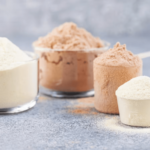
Craig Ballard
(MSc (Sports & Exercise Nutrition), BSc, BTEC (Sports & Exercise Sciences), CYQ/QCF (Personal training and Instruction))
Jump to:
- What is Potassium?
- Potassium deficiency
- Different types of Potassium
- Health Benefits
- Health Claims
- Best sources of Potassium
- Daily requirements and intake
- How to take Potassium
- Signs and symptoms of deficiency
- Risks and side effects
- Interactions - herbs and supplements
- Interactions - medication
- Summary
- Related Questions
Potassium is often not talked about since a well-balanced diet satisfies minimum amounts. Though minimum, or adequate amounts may prevent health issues, we should instead focus on achieving optimal health, which is what this article focuses on.
Potassium has an important effect on:
- controlling blood pressure
- reduction in stroke and cardiovascular diseases
- assisting with healthy kidney function
- aiding muscle contraction and alleviating muscle cramps
- aiding with neuromuscular function
With summer and excessive sweating around the corner, it’s important to be aware of our potassium levels to prevent abnormal blood pressure, heart palpitations and irregular heartbeat.
First, let’s start with the history and discovery of potassium as a supplement.
What is Potassium?
Potassium, represented by the symbol K, is an essential mineral for various bodily functions. Serving as a key electrolyte, its primary function is to maintain the proper fluid equilibrium within our cells.
It often acts in harmony with sodium to regulate blood pressure and is integral to the proper functioning of the heart, muscles, and the facilitation of nerve communication.[1,2]
History behind Potassium
Potassium compounds like potassium carbonate have been used since ancient times. They were employed in making soap and glass by ancient civilizations such as the Egyptians.
Potassium was first discovered in 1807 by Sir Humphry Davy of England. He noticed a tiny droplet of liquid metal during his experiments with electrolysis on a molten potash sample. Davy named this element “potassium” based on the term “potash”.[3]
Over time, potassium and its compounds found various uses in agriculture, industry, medicine, and research. It’s a crucial element for plant growth, making it essential in agricultural fertilisers.[4]
Potassium as a supplement
The earliest documented use of potassium supplementation was published in 1945. However, potassium supplements were likely introduced in the mid-20th century to aid those struggling to get enough potassium from their regular diets.
Today, potassium supplements are readily available and play a crucial role in managing potassium levels for individuals with specific health conditions or dietary restrictions.

Food fortification
Potassium is added to a range of processed and packaged foods like certain fruit juices, breakfast cereals, dairy alternatives, and sports drinks.
These fortified foods help people boost their potassium intake, especially if they find it challenging to get enough from natural dietary sources.
Potassium deficiency
In healthy individuals with normal kidney function, abnormally low or high blood levels of potassium are rare.
Potassium deficiency, also known as hypokalemia, occurs when the body has a lower than normal amount of potassium in the blood (normal range: 3.5–5.0 mEq/L). This is caused by inadequate potassium intake or excessive potassium loss.[5]
Potassium loss can occur in three ways:
Frequent factors contributing to potassium deficiency include:
- Insufficient dietary consumption
- Increased loss due to vomiting
- Diarrhoea
- Excessive sweating
- Usage of specific medications like diuretics
Nevertheless, it’s important to note that potassium deficiency is rarely induced solely by an inadequate dietary intake of potassium.
Who is most at risk of Potassium deficiency?
Individuals facing conditions such as
- kidney disorders
- gastrointestinal ailments
- eating disorders
face an elevated risk of potassium deficiency due to potassium being absorbed via passive diffusion, primarily in the small intestine.
RELATED — Understanding Eating Disorders: History, Types and Statistics
Typical clinical scenarios linked with this deficiency encompass anorexia nervosa, crash/fad diets, alcoholism, and intestinal malabsorption. Hypokalemia is categorised as severe and life-threatening when potassium levels fall below <2.5 mEq/L.[7]
Excessive potassium excretion and contributing factors
Individuals using diuretic medications or affected by endocrine disorders have an increased tendency for excessive potassium excretion through urine (kaliuresis). Diuretics and penicillin are often identified as the underlying causes of hypokalemia.[5]
Another common factor associated with hypokalemia is magnesium deficiency, present in more than 50% of clinically significant cases.[7]
RELATED — Magnesium (for a great night of sleep)
Women are potentially more susceptible to potassium deficiency, especially those with a high sodium intake, benefitting from a higher potassium intake for blood pressure and cardiovascular health.[8]
Athletes and individuals engaging in intense physical activity
Athletes and those who engage in intense physical activities may require more potassium to replenish what is lost through sweat.
Elderly and seniors
Elderly people may have reduced potassium absorption and decreased dietary intake, making them more susceptible to potassium deficiency.
Individuals on special or restrictive eating patterns
Individuals on very low-calorie diets or those following fad diets that exclude potassium-rich foods can be at risk of deficiency.
It’s important to address the underlying cause of the deficiency and work with a healthcare provider to develop an appropriate treatment plan.
Restrictive diets can cause potassium deficiency
If you suspect a potassium deficiency, seeking medical attention is crucial for proper diagnosis and management.
Different types of Potassium
Various forms of potassium supplements are available to meet different needs and preferences. Potassium is present in five primary forms:
- Food solids
- Capsules
- Salts
- Powder
- Liquid
Each type has distinct characteristics and formulations. The choice of a particular potassium supplement depends on individual requirements, health conditions, and professional healthcare advice.
In terms of sheer convenience, capsules and pre-diluted liquid potassium supplements are often the most straightforward options, but the best choice for you ultimately depends on your preferences and dietary needs.
Potassium Chloride
Derived from potash, this is a popular choice for dietary supplements and is often labelled with the E number E508 when used in processed foods.[3]
RELATED — 5 Most Common Food Additives in our Food (and should we avoid them)? (Part 1)
Potassium Citrate
Known for its quick absorption rates, potassium citrate is commonly used to address conditions related to high uric acid levels, such as gout and kidney stones.[9]
Potassium Phosphate
This is a collective term encompassing various potassium salts like Monopotassium phosphate, Dipotassium phosphate, and Tripotassium phosphate, often used in fertilisers, food additives, and buffering agents.[10]
Potassium Aspartate
Combining potassium and aspartic acid, this form was initially popular as an ergogenic sports supplement, however, recent studies have shown less promising effects. It is sometimes used as an alternative to potassium chloride for managing hypertension.[11,12]
Potassium Bicarbonate
An economical compound utilised in baking powders and food production, it acts as a buffering agent and a sports supplement to regulate pH levels. It is available in effervescent tablets or powder.[13]
Potassium Gluconate
Well-tolerated and easily absorbed by the body, potassium gluconate is often found in tablets or capsules, making it a suitable option for individuals who struggle with potassium chloride. It serves as an acidity regulator labelled with E number E577.[14]
Potassium Orotate
This form combines potassium with orotic acid and is present in small amounts in dairy products. It is often used in supplements and is believed to offer good bioavailability.
Potassium Iodine
While commonly mistaken as a potassium form, potassium iodine is actually a source of iodine, not potassium.
Health benefits of Potassium
Consuming an adequate amount of potassium has a whole range of health benefits. Potassium is present in all body tissues and is required for normal cell function. Because of this it’s important to maintain a balanced diet that includes potassium-rich foods.
Controlling blood pressure
Potassium helps manage blood pressure in several ways, largely through counteracting the effects of sodium, contributing to lower blood pressure and reducing the risk of hypertension.[2,15]
By functioning as a vasodilator, potassium induces the relaxation and expansion of blood vessels. This expansion reduces resistance within the blood vessels, facilitating smoother blood flow. Consequently, the heart’s workload is reduced, leading to a drop in blood pressure.[2]
Furthermore, potassium supports the proper functioning of the endothelium, the lining of blood vessels. A healthy endothelium helps maintain blood vessel tone and flexibility, contributing to lower blood pressure.[2,8]
Potassium also has an impact on the release of aldosterone, a hormone that governs blood pressure.[2]
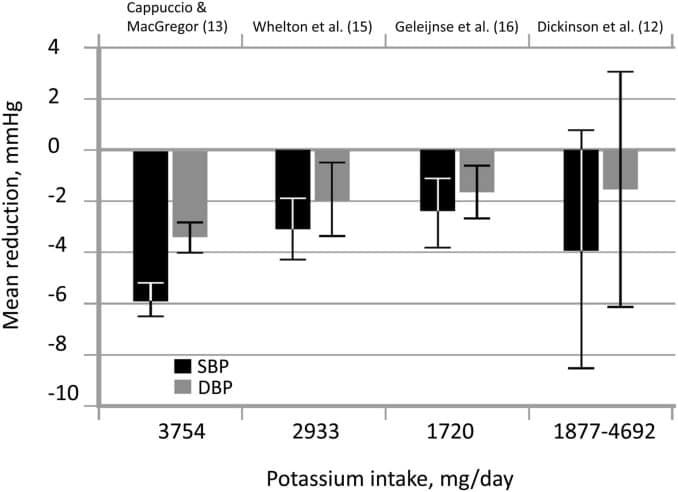
Reduction in systolic blood pressure in women
In both males and females, increased potassium consumption was linked to a reduced risk of cardiovascular events. However, the hazard ratio for higher potassium intake was less in women compared to men.
The connection between potassium intake, systolic blood pressure (SBP), and cardiovascular disease events appears to be influenced by gender.
The data indicates that women, especially those with a high sodium intake, experience the most significant benefit from increased potassium intake concerning their SBP.[8]

Linear and Cox regression analyses showed that the association between potassium intake and both SBP and CVD risk is sex specific. Moreover, among women, the association between potassium intake and SBP was modified by sodium intake.
Reduction in stroke and cardiovascular diseases
Some research suggests that higher potassium intake may be associated with a reduced risk of stroke and cardiovascular disease.[16,17,18]
Hypertension is a major contributor to the development of blood vessel damage and blockages in the brain, which can lead to strokes. Lowering blood pressure through potassium intake can significantly reduce the risk of stroke.[16,18]
Maintaining healthy blood pressure with sufficient potassium intake also reduces the risk of cardiovascular diseases, including heart attacks and atherosclerosis (hardening of the arteries). It prevents excessive strain on the heart and helps maintain the integrity of blood vessel walls.[2,18]
Potassium reduces the risk of strokes
Adequate potassium levels also help prevent abnormal heart rhythms, which can be a risk factor for cardiovascular events.[2]
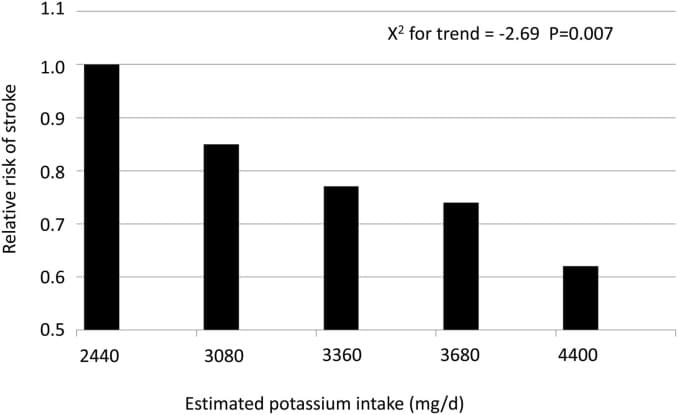
Possible improvements in bone health
Some studies suggest that a diet rich in potassium may help improve bone health by reducing calcium loss and minimising the risk of osteoporosis, though this is still debated.[19,20]
RELATED — Calcium (for healthy bones, teeth and heart)
There are a few hypotheses as to how potassium may influence bone health:
- Potentially impacts the body’s acid-base equilibrium by promoting a more alkaline environment, potentially reducing calcium loss from bones
- Adequate potassium levels may promote the absorption of calcium in the intestines
- Potassium helps reduce the amount of calcium excreted in urine
- Reduced bone turnover due to acid base theory lowering pH
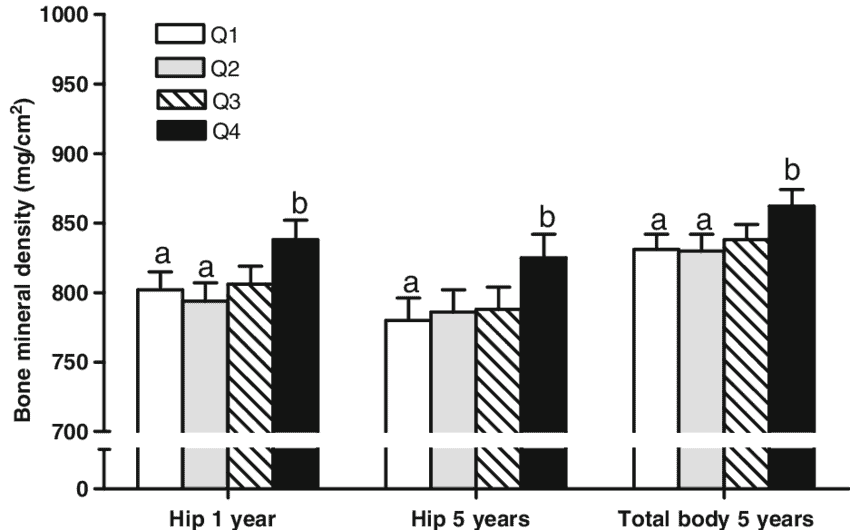
Facilitates healthy kidney function
Adequate potassium intake supports healthy kidney function by assisting in waste elimination and maintaining the body’s acid-base balance.[2,9]
Potassium does this by regulating electrolyte balance, blood pressure, fluid balance, and acid-base. Potassium plays a role in this process by influencing the balance of hydrogen ions and bicarbonate ions, which is essential for maintaining the kidney’s acid-base regulatory function.[2,9]
It also helps prevent kidney stones and is involved in blood filtration and renin production (a hormone produced by cells in the kidneys that plays a role in regulating blood pressure). Potassium levels can influence the production and release of renin, thereby affecting blood pressure regulation.[2,9]
Regulates fluid balance and pH levels
Potassium helps maintain the balance of fluids in and out of cells, aiding in proper cellular function and hydration, specifically intracellular fluid volume. Potassium does this by helping to maintain osmotic pressure (the force that drives the movement of water between the cells).[21,22]
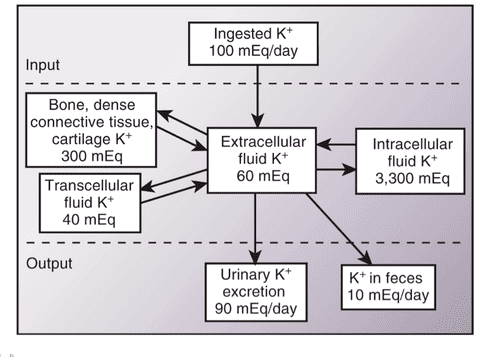
As previously noted, potassium contributes to the maintenance of the body’s acid-base balance. It does this by influencing the exchange of hydrogen ions (H+) and potassium ions (K+) in the kidneys. This exchange helps regulate blood pH and prevents it from becoming too acidic or too alkaline.
Aids muscle contraction and alleviates muscle cramps
Adequate potassium levels are crucial for normal muscle contraction and can potentially help prevent muscle cramps and spasms, particularly during exercise or physical activity that incorporate fast-twitch muscle fibres.[23,24]
Potassium shifts with high-intensity exercise may contribute substantially to fatigue in skeletal muscle, resulting in potassium being a potential variable of muscle cramp.
There is limited data to support the severity of potassium deficiency and a tendency of muscle cramp, however a reduction in electrolytes lost through sweat is likely a contributing factor.
Enhances nervous system function
Potassium plays a role in nerve impulse transmission, helping the nervous system function effectively.[25,26]
Nerve cell communication
Potassium helps conduct electrical impulses within nerve cells. These electrical impulses are the basis of nerve cell communication and are essential for the transmission of signals throughout the nervous system.
Resting membrane potential
Potassium helps keep the inside of the cell negatively charged relative to the outside, which is essential for the readiness of nerve cells to generate and transmit nerve impulses.
Neuromuscular function
The nervous system controls muscle contractions, and potassium is essential for proper neuromuscular function. It helps nerve cells transmit signals to muscle cells, leading to muscle contractions. Without adequate potassium, muscle weakness or paralysis can occur.
Potassium is essential for neuromuscular function
Synaptic transmission
In the brain, potassium is involved in the release of neurotransmitters at synapses. Neurotransmitters are chemical messengers that allow nerve cells to communicate with each other.
Proper synaptic transmission is vital for cognitive functions, memory, and overall brain function.
Health claims that still need more evidence and research
Some potential benefits require additional evidence before a definitive conclusion can be drawn regarding their effectiveness. We share some of them below.
Alleviating or preventing arthritis
Some believe potassium may alleviate arthritis symptoms or hinder its onset, though there is currently little evidence to support this. Potassium supplementation however, may provide some relief to those suffering with rheumatoid arthritis.[27]
Enhancing athletic performance
Although vital for muscle function, potassium supplementation alone significantly boosting performance lacks strong scientific backing.
Regarding athletes, supplementation plays a role in preserving electrolyte equilibrium, which can prove advantageous for those engaged in prolonged practices or games where sweating is common.
Potassium also plays a role in carbohydrate breakdown, contributing to sustained energy levels during intense physical activity, potentially enhancing performance.
Potassium plays a role in carbohydrate breakdown
Additionally, potassium aids in diminishing the accumulation of lactic acid in muscles, potentially reducing fatigue and supporting a healthy metabolism. It’s worth noting that there have been no documented reports of ergogenic effects.[28]
Weight management
While a balanced diet rich in potassium-containing foods is advantageous for weight control, substantial evidence supporting potassium supplements as direct aids for weight loss is limited.
Weight management in terms of fluid balance is the only direct variable that would impact an individual’s weight loss or gain in regards to potassium intake. Indirect variables that may impact weight management efforts may include the regulation of metabolism and appetite control.[29]
It is important to avoid the misconception that potassium supplementation is a direct solution for fat loss. Instead, its primary impact on weight is related to fluid balance. Therefore, it should not be solely regarded as a means for reducing fat levels.
Alleviating anxiety and stress
Scientific proof substantiating a reduction in anxiety or stress levels due to potassium intake is insufficient. While vital for nervous system function, potassium is just one of several factors affecting mental well-being.
RELATED — Understanding Stress: The Silent Killer
Considering potassium’s role in cognitive function, it is reasonable to propose that it could potentially influence our cognitive processes, decision-making, and voluntary muscle movements, all of which are elements that may have implications for symptoms of anxiety or stress.[2]
Promoting hair growth
Claims suggesting potassium’s role in promoting hair growth or preventing hair loss lack substantial evidence confirming this specific effect.
The only viable evidence is in the suggestion that a certain potassium channel, the Minoxidil, stimulates hair growth by increasing the anagen phase of the hair cycle by enhancing angiogenesis around the hair follicle but the exact mechanisms are unknown.[30]
Best sources of Potassium
Potassium is abundant in various foods, particularly fruits, vegetables, legumes, and dairy products. Below are some of the best sources of potassium.
| Food | Potassium Content (mg) per 100g |
| Apricots (dried) | 1162 mg |
| Pistachios (roasted) | 1025 mg |
| Spinach | 558 mg |
| Avocados | 485 mg |
| Acorn Squash | 437 mg |
| Potatoes (baked) | 429 mg |
| Kidney beans | 406 mg |
| Lentils | 369 mg |
| Salmon | 363 mg |
| Bananas | 358 mg |
| Sweet Potatoes | 337 mg |
| Cantaloupe | 267 mg |
| Tomatoes | 237 mg |
| Oranges | 181 mg |
| Yogurt | 155 mg |
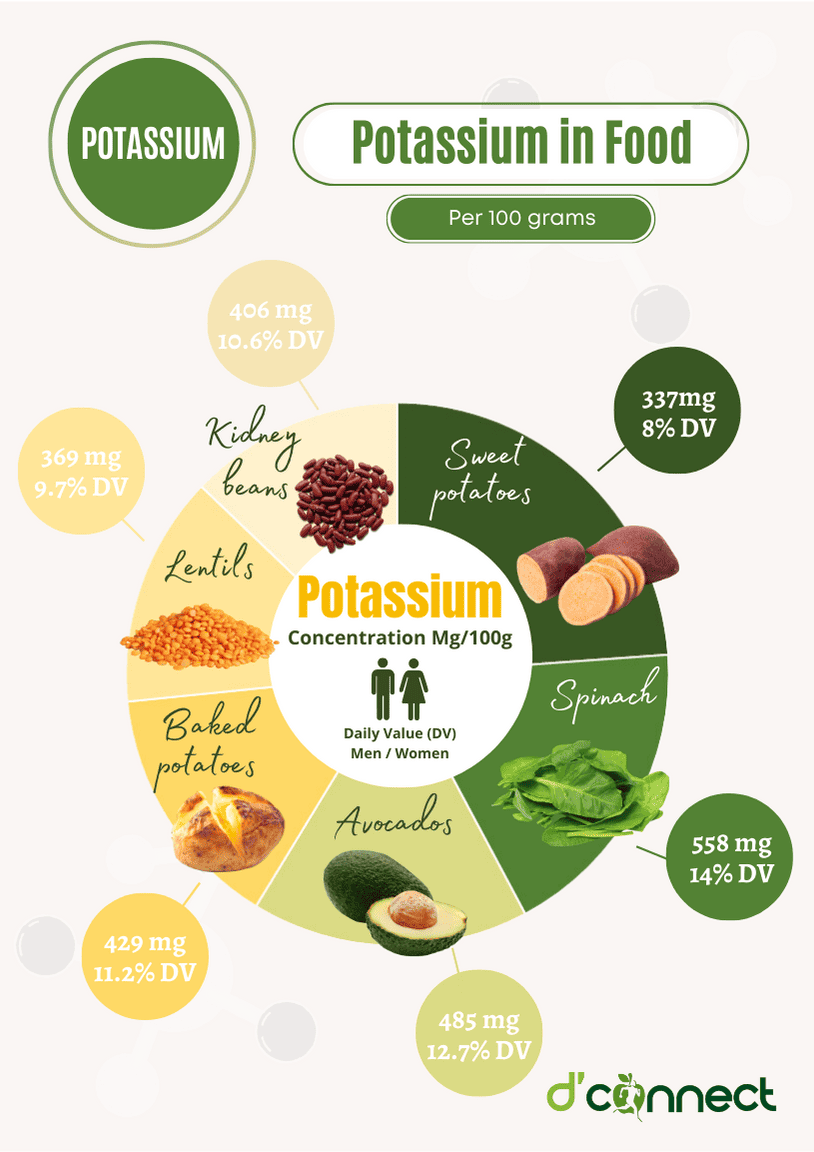
These potassium values are approximate and can vary slightly based on factors such as ripeness, cooking methods, and growing conditions.
Daily requirements and recommended intake
The recommended daily intake of potassium can vary slightly depending on the country and the guidelines provided by respective health authorities.
In New Zealand, dietary recommendations are typically based on guidelines set by the Ministry of Health. Requirements may vary from person to person depending on your personal situation and lifestyle.[31,32]
| Age Group | Adequate Intake (AI) of Potassium (mg/day) | Adequate Intake (AI) of Potassium (mmol) |
| Infants (0-6 months) | 400 | 10 |
| Infants (7-12 months) | 700 | 18 |
| Children & Adolescents | – | – |
| 1-3 year | 2,000 | 50 |
| 4-8 years | 2,300 | 60 |
| Boys (9-13 years) | 3,000 | 76 |
| Boys (14-18 years) | 3,600 | 92 |
| Girls (9-13 years) | 2,500 | 64 |
| Girls (14-18 years) | 2,600 | 66 |
| Adults (Men) | – | – |
| 19-30 years | 3,800 | 100 |
| 31-50 years | 3,800 | 100 |
| 51-70 years | 3,800 | 100 |
| >70 years | 3,800 | 100 |
| Adults (Women) | – | – |
| 19-30 years | 2,800 | 72 |
| 31-50 years | 2,800 | 72 |
| 51-70 years | 2,800 | 72 |
| >70 years | 2,800 | 72 |
| Age Group | Adequate Intake (AI) of Potassium (mg/day) | Adequate Intake (AI) of Potassium (mmol) |
| Pregnancy | – | – |
| 14-18 years | 2,800 | 72 |
| 19-30 years | 2,800 | 72 |
| 31-50 years | 2,800 | 72 |
| Lactation | – | – |
| 14-18 years | 3,200 | 82 |
| 19-30 years | 3,200 | 82 |
| 31-50 years | 3,200 | 82 |
The Adequate Intake (AI) values for potassium are provided in milligrams per day (mg/day) and millimoles (mmol) for each age group.
How to take Potassium as a supplement
Potassium is present in the majority of multivitamin/mineral supplements, usually at approximately 80mg, which is a small fraction of the recommended Adequate Intake (AI).
Individual potassium supplements differ in their content, typically averaging around 99mg, and when it comes to powdered forms, users must determine their own serving size.[33]
It’s important to distinguish between the potassium content and the potassium compound. Supplement labels often list higher levels of the potassium compound, such as Potassium Gluconate, while some products may not provide information about the actual potassium content.
There is no established upper limit for potassium intake, making it uncertain what constitutes a safe maximum amount.
Extremely high potassium doses can potentially be fatal
Before taking any potassium supplementation always make sure to read the label before consumption. Here’s a general guideline to follow for best use:
- Follow dosage instructions — adhere to the dosage instructions provided by your healthcare professional or as indicated on the supplement label.
- Take with food or water — typically, it’s best to take potassium supplements with food or a large glass of water to prevent stomach upset.
- Spread dosages throughout the day — if your doctor prescribes a higher dosage, consider splitting the dose throughout the day to improve absorption and minimise the risk of gastrointestinal side effects.
- Avoid taking on an empty stomach — taking potassium supplements on an empty stomach may increase the risk of stomach upset or gastrointestinal discomfort. Always take them with a meal or snack.
- Combine with a balanced diet — while taking supplements, continue to consume a well-balanced diet that includes potassium-rich foods like fruits, vegetables, legumes, and dairy products.
RELATED — The Healthy Plate Model: Essentials of Healthy Eating
Always consult a healthcare professional before starting any new supplement, especially if you have underlying health conditions, are taking medications, or are pregnant or breastfeeding.
Common signs and symptoms of Potassium deficiency
Potassium deficiency can manifest through various signs and symptoms. The severity of these symptoms can range from mild to severe, depending on the level of potassium depletion in the body.
Symptoms generally do not become present until serum potassium is below 3.0 mEq/L.[33]
Common signs and symptoms of potassium deficiency include:
- Muscle weakness, cramps or spasms — weakness and fatigue are among the earliest symptoms of potassium deficiency. It may affect daily activities and exercise performance. Potassium is essential for proper muscle function. Low potassium levels can cause muscle cramps, twitching, and spasms, particularly in the legs.[5,33]
- Excessive thirst and frequent urination — potassium deficiency can disrupt the balance of fluids in the body, causing increased urination and thirst.[5,33]
- Tiredness and constipation — potassium helps in maintaining proper bowel function. A deficiency can lead to constipation or other digestive issues.[5,33]
- Abnormal blood pressure, heart palpitations and irregular heartbeat — hypokalemia can have detrimental effects on the cardiovascular system, leading to electrocardiographic (ECG) changes, cardiac arrhythmias and heart failure.[5,33]
- Numbness and tingling — potassium is vital for nerve function. Low levels can cause tingling or numbness, usually in the extremities such as hands and feet.[5,33]
Symptoms usually resolve with correction of the hypokalemia.
Potassium risks and side effects
Excessive intake of potassium can cause hyperkalemia which can occur when serum potassium levels are greater than 5.0 mEq per L.[34,35]
Acute or mild symptoms are unlikely with hyperkalemia though some may experience:
- Abdominal pain
- Diarrhoea
- Nausea and vomiting
More severe levels of hyperkalemia can cause:
- Chest pain
- Heart palpitations
- Arrhythmia (irregular, fast or fluttering heartbeat)
- Muscle weakness or numbness in limbs
In individuals with normal kidney function, a heightened potassium intake from a well-rounded diet does not pose health hazards, and thus, there is currently no specified upper limit for potassium from food alone.
However, isolated incidents suggest potential irregularities in heart rhythm and fatalities stemming from extremely elevated doses of potassium supplements.[33,36]
Hyperkalemia may also manifest in individuals dealing with type 1 diabetes, congestive heart failure, adrenal insufficiency, or liver disease.
RELATED — Type 1 Diabetes: Autoimmune disease that is on the rise
While some cases of hyperkalemia can be symptomless, severe instances can lead to muscle weakness, paralysis, heart palpitations, paresthesias (a tingling or pricking sensation in the extremities), and life-threatening cardiac arrhythmias.[37]
Possible interactions with herbs and supplements
Some herbal supplements, such as nettle, dandelion, and alfalfa, can contain elevated levels of potassium. If these supplements are taken alongside potassium-rich foods or potassium supplements, it could result in an excessive potassium intake.
RELATED — Dandelion (Taraxacum officinale)
There are no particular supplements or herbs that demonstrate a direct adverse interaction with potassium supplementation.
Prior to consuming potassium supplements, it is essential to seek guidance from a dietitian or a medical professional.
Possible interactions with medications
Various types of medications have the potential to impact potassium levels, posing potential risks. A few examples are outlined below.
Individuals taking these or other medications should engage in a discussion about their potassium intake and levels with their healthcare providers.[38,39]
Medications to inquire more about if taking potassium as a supplement are:
- Thiazides
- Loop diuretics
- Osmotic diuretics
- Laxatives
- Amphotericin B
- Antipseudomonal penicillins (carbenicillin)
- High doses of penicillin
- Theophylline (both acute and chronic intoxication)
- Ammonium chloride
- Antacids
- Eplerenone
- Histamine blockers for cold or allergy
- Medications for bladder spasm such as oxybutynin and tolterodine
- Medications for movement abnormalities or Parkinson’s disease
- Potassium-sparing diuretics
- Sodium polystyrene sulfonate
- Certain stomach medications like chlordiazepoxide and dicyclomine
For signs and symptoms of interactions, keep an eye out for:
- Allergic reactions — skin rash, itching, hives, swelling of the face, lips, tongue, or throat
- Esophageal ulcer — loss of appetite, throat pain, difficulty swallowing, heartburn, nausea, vomiting, dry cough
- Elevated potassium levels — muscle weakness, fast or irregular heartbeat
- Stomach bleeding — bloody or black, tar-like stools, vomiting blood or brown material resembling coffee grounds
Should you encounter these subsequent side effects, it is vital to promptly notify your healthcare professional.
Summary
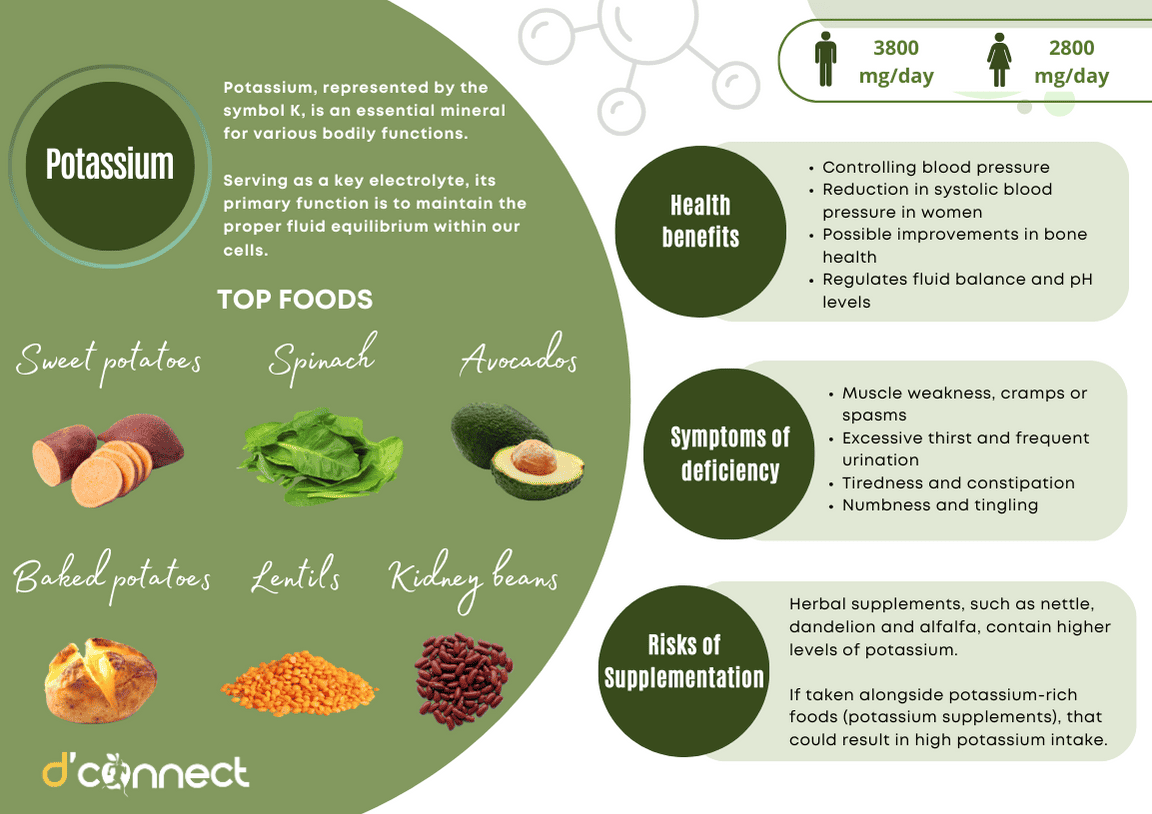
Key Takeaway — In this illustration we have outlined the most important information that you should know about Potassium.
Related Questions
1. What (natural) drinks are high in potassium?
Many natural drinks are high in potassium. Here are a few examples:
- Orange Juice
- Coconut Water
- Tomato Juice
- Prune Juice
- Banana Smoothie
- Pomegranate Juice
- Spinach Smoothie
- Carrot Juice
- Beet Juice
2. Is eating 1 banana a day enough potassium?
A banana typically contains 400-450 milligrams of potassium. Eating one banana a day will not provide your full daily potassium requirement, which typically ranges from 2,500 to 3,000 milligrams for adults.
3. What are other electrolytes that are important for our health?
In addition to potassium, other important electrolytes for our health include:
- Sodium
- Calcium
- Magnesium
- Chloride
- Phosphorus
- Bicarbonate
- Sulfate
If you have a question regarding potassium, or taking potassium supplements, please let us know in the comments below. Also, we suggest checking our Nutrition section for more similar articles.
Craig is a New Zealand registered nutritionist and personal trainer with over a decade of experience in the health and fitness sector delivering practical, evidence informed exercise and nutrition services. Most recently, Craig has qualified as a performance nutritionist from Leeds University in 2020.
With a strong inclination towards performance nutrition, Craig is particularly passionate about the utilisation of plant-based nutrition in the context of sports and athletics.
Throughout his extensive 12-year career as a health and fitness professional, Craig has collaborated with a diverse range of clients, which includes athletes at all levels, individuals competing in physique contests, and the general population.
Craig is dedicated to imparting knowledge to others by advocating for principles and practices related to physical well-being and lifestyle management.
References
(1) Stone, M., Martyn, L., & Weaver, C. (2016a). Potassium Intake, Bioavailability, Hypertension, and Glucose Control. Nutrients, 8(7), 444. https://doi.org/10.3390/nu8070444
(2) Weaver, C. M. (2013). Potassium and health. Advances in Nutrition, 4(3), 368S-377S. https://doi.org/10.3945/an.112.003533
(3) Weeks, M. E. (1932). The discovery of the elements. IX. Three alkali metals: Potassium, sodium, and lithium. Journal of Chemical Education, 9(6), 1035. https://doi.org/10.1021/ed009p1035
(4) Potassium fertilizers (penn state agronomy guide). (n.d.). Retrieved October 14, 2023, from Penn State Agronomy Guide (Penn State Extension) website: https://web.archive.org/web/20161220172926/http://extension.psu.edu/agronomy-guide/cm/sec2/sec28c
(5) Kardalas, E., Paschou, S. A., Anagnostis, P., Muscogiuri, G., Siasos, G., & Vryonidou, A. (2018). Hypokalemia: A clinical update. Endocrine Connections, 7(4), R135–R146. https://doi.org/10.1530/ec-18-0109
(6) Palmer, B. F., & Clegg, D. J. (2016). Physiology and pathophysiology of potassium homeostasis. Advances in Physiology Education, 40(4), 480–490. https://doi.org/10.1152/advan.00121.2016
(7) Huang, C.-L., & Kuo, E. (2007). Mechanism of hypokalemia in magnesium deficiency. Journal of the American Society of Nephrology, 18(10), 2649–2652. https://doi.org/10.1681/asn.2007070792
(8) Wouda, R. D., Boekholdt, S. M., Khaw, K. T., Wareham, N. J., de Borst, M. H., Hoorn, E. J., … Vogt, L. (2022). Sex-specific associations between potassium intake, blood pressure, and cardiovascular outcomes: The EPIC-Norfolk study. European Heart Journal, 43(30), 2867–2875. https://doi.org/10.1093/eurheartj/ehac313
(9) Goldfarb, D. S. (2018). Empiric therapy for kidney stones. Urolithiasis, 47(1), 107–113. https://www.ncbi.nlm.nih.gov/pmc/articles/PMC6361718/
(10) Elvers, B. (2011). Ullmann’s encyclopedia of industrial chemistry – 7th edition in print / sample volume. Wiley-VCH.
(11) Trudeau, F., & Murphy, R. (1993). Effects of potassium-aspartate salt administration on glycogen use in the rat during a swimming stress. Physiology & Behavior, 54(1), 7–12. https://doi.org/10.1016/0031-9384(93)90036-f
(12) Franzoni, F., Santoro, G., Carpi, A., Da Prato, F., Bartolomucci, F., Femia, F. R., … Galetta, F. (2005). Antihypertensive effect of oral potassium aspartate supplementation in mild to moderate arterial hypertension. Biomedicine & Pharmacotherapy, 59(1–2), 25–29. https://doi.org/10.1016/j.biopha.2004.11.002
(13) Chycki, J., Golas, A., Halz, M., Maszczyk, A., Toborek, M., & Zajac, A. (2018). Chronic ingestion of sodium and potassium bicarbonate, with potassium, magnesium and calcium citrate improves anaerobic performance in elite soccer players. Nutrients, 10(11), 1610. https://doi.org/10.3390/nu10111610
(14) WHO. (n.d.). Retrieved October 14, 2023, from JECFA website: https://apps.who.int/food-additives-contaminants-jecfa-database/Home/Chemical/4660
(15) Cappuccio, F. P., & MacGregor, G. A. (1991b). Does potassium supplementation lower blood pressure? A meta-analysis of published trials. Journal of Hypertension, 9(5), 465–473. https://doi.org/10.1097/00004872-199105000-00011
(16) Khaw, K.-T., & Barrett-Connor, E. (1987). Dietary potassium and stroke-associated mortality. New England Journal of Medicine, 316(5), 235–240. https://doi.org/10.1056/nejm198701293160502
(17) Mann, S. (2012). Urinary sodium excretion and cardiovascular events. JAMA, 307(11). https://doi.org/10.1001/jama.2012.326
(18) Strazzullo, P., D’Elia, L., Kandala, N.-B., & Cappuccio, F. P. (2009). Salt intake, stroke, and cardiovascular disease: Meta-analysis of prospective studies. BMJ, 339(nov24 1), b4567–b4567. https://doi.org/10.1136/bmj.b4567
(19) Arnett, T. R. (2007). Acid–base regulation of bone metabolism. International Congress Series, 1297, 255–267. https://doi.org/10.1016/j.ics.2006.08.005
(20) Moseley, K. F., Weaver, C. M., Appel, L., Sebastian, A., & Sellmeyer, D. E. (2013). Potassium citrate supplementation results in sustained improvement in calcium balance in older men and women. Journal of Bone and Mineral Research, 28(3), 497–504. https://doi.org/10.1002/jbmr.1764
(21) An integrated view of potassium homeostasis. (2015). New England Journal of Medicine, 373(13), 1281–1281. https://doi.org/10.1056/nejmx150027
(22) McDonough, A. A., & Youn, J. H. (2017). Potassium homeostasis: The knowns, the unknowns, and the health benefits. Physiology, 32(2), 100–111. https://doi.org/10.1152/physiol.00022.2016
(23) DiBartola, S. P., & de Morais, H. A. (2006). Disorders of potassium: Hypokalemia and hyperkalemia. In Fluid, Electrolyte, and Acid-Base Disorders in Small Animal Practice (pp. 91–121). Elsevier. Retrieved from http://dx.doi.org/10.1016/b0-72-163949-6/50008-4
(24) Jain, V., Gupta, O., Jajoo, S., & Khiangate, B. (2011). Hypokalemia induced rhabdomyolysis. Indian Journal of Nephrology, 21(1), 66. https://doi.org/10.4103/0971-4065.78085
(25) Beckner, M. E. (2020). A roadmap for potassium buffering/dispersion via the glial network of the CNS. Neurochemistry International, 136, 104727. https://doi.org/10.1016/j.neuint.2020.104727
(26) Durand, D. M., Park, E.-H., & Jensen, A. L. (2010). Potassium diffusive coupling in neural networks. Philosophical Transactions of the Royal Society B: Biological Sciences, 365(1551), 2347–2362. https://doi.org/10.1098/rstb.2010.0050
(27) Rastmanesh, R., Abargouei, A. S., Shadman, Z., Ebrahimi, A. A., & Weber, C. E. (2008). A pilot study of potassium supplementation in the treatment of hypokalemic patients with rheumatoid arthritis: A randomized, double-blinded, placebo-controlled trial. The Journal of Pain, 9(8), 722–731. https://doi.org/10.1016/j.jpain.2008.03.006
(28) Ghazzawi, H. A., Hussain, M. A., Raziq, K. M., Alsendi, K. K., Alaamer, R. O., Jaradat, M., … Jahrami, H. (2023). Exploring the Relationship between Micronutrients and Athletic Performance: A comprehensive scientific systematic review of the literature in sports medicine. Sports, 11(6), 109. https://doi.org/10.3390/sports11060109
(29) Tal, B., Sack, J., Yaron, M., Shefer, G., Buch, A., Ben Haim, L., … Stern, N. (2019). Increment in dietary potassium predicts weight loss in the treatment of the metabolic syndrome. Nutrients, 11(6), 1256. https://doi.org/10.3390/nu11061256
(30) Bhat, Y., Saqib, N.-U.-, Latif, I., & Hassan, I. (2020). Female pattern hair loss—An update. Indian Dermatology Online Journal, 11(4), 493. https://doi.org/10.4103/idoj.idoj_334_19
(31) Nutrient reference values for Australia and New Zealand: Including recommended dietary intakes. (2006).
(32) Weaver, C. M., Stone, M. S., Lobene, A. J., Cladis, D. P., & Hodges, J. K. (2018). What is the evidence base for a potassium requirement? Nutrition Today, 53(5), 184–195. https://doi.org/10.1097/nt.0000000000000298
(33) Office of Dietary Supplements – Potassium. (n.d.). Retrieved from Health Professional Fact Sheet website: https://ods.od.nih.gov/factsheets/Potassium-HealthProfessional/
(34) Palmer, B. F., & Clegg, D. J. (2017). Diagnosis and treatment of hyperkalemia. Cleveland Clinic Journal of Medicine, 84(12), 934–942. https://doi.org/10.3949/ccjm.84a.17056
(35) Professional, C. C. medical. (n.d.). Hyperkalemia (high potassium). Retrieved October 15, 2023, from Cleveland Clinic website: https://my.clevelandclinic.org/health/diseases/15184-hyperkalemia-high-blood-potassium
(36) Medicine, I. of, Board, F. and N., Intakes, S. C. on the S. E. of D. R., & Water, P. on D. R. I. for E. and. (2005). Dietary reference intakes for water, potassium, sodium, chloride, and sulfate. National Academies Press.
(37) J. Kim, M., MD, Valerio, C., MD, & K. Knobloch, G., MD. (2023). Potassium Disorders: Hypokalemia and Hyperkalemia. American Family Physician, 107(1), 59–70.
(38) Raebel, M. A. (2011). Hyperkalemia associated with use of angiotensin-converting enzyme inhibitors and angiotensin receptor blockers. Cardiovascular Therapeutics, 30(3), e156–e166. https://doi.org/10.1111/j.1755-5922.2010.00258.x
(39) Sarafidis, P. A., Georgianos, P. I., & Lasaridis, A. N. (2010). Diuretics in clinical practice. Part II: Electrolyte and acid-base disorders complicating diuretic therapy. Expert Opinion on Drug Safety, 9(2), 259–273. https://doi.org/10.1517/14740330903499257






